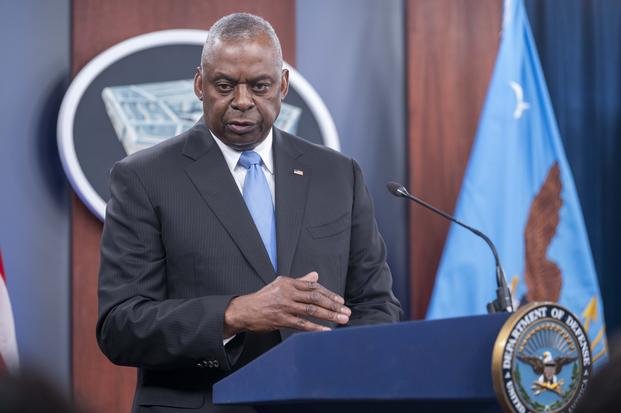Defense Secretary Lloyd Austin said Thursday that, in his more than three years of working with Vice President Kamala Harris, she has been with him and the president for some of their toughest decisions and "always a part of the process."
The assessment, which Austin offered in response to a question about the vice president from reporters during a Pentagon press conference, comes just days after President Joe Biden's surprise decision not to seek reelection in November and Harris being on track to take over for him at the top of the Democratic ticket.
Austin, a retired four-star Army[1] general and now a civilian Cabinet member and Biden appointee, painted Harris as prepared and always engaged on national security issues. He said at the start of his remarks that he was not making "any kind of political commentary" but rather relaying what he witnessed as defense secretary.
Read Next: National Guard May Be Without Leadership After Last-Minute White House Nomination for New Chief[2]
If reporters look at what the Biden administration has tackled "over the past three and a half years -- strikes that we've had to take, the deployments[3] that we've done, the decision to support Ukraine ... there's just thing after thing after thing," Austin said.
"She's always there, she's always a part of the process, and she's always very engaged," he added.
In her brief time as the likely presidential nominee, Harris has already started to receive scrutiny from Republicans for her role on tackling immigration from Central America, while she has begun to highlight her background as a prosecutor.
As a result, little is known about her views on the military[4] and veterans issues or how she would act as commander in chief. The Associated Press reported Thursday[5] that Harris was scheduled to meet separately with Israeli Prime Minister Benjamin Netanyahu, apart from a meeting Biden had scheduled with the Israeli leader during his visit to Washington, D.C., suggesting she may become more involved in global security issues as a presidential candidate.
Austin's remarks suggested that, while Harris may have been out of the public eye for much of the Biden administration's time in the White House, she was an active participant in national security decisions.
"I've seen her help the team, help the president work through some very, very complex issues," Austin said, adding that "she is a key player."
In 2021, Harris told CNN[6] that she was the last person in the room and supported Biden's decision to completely withdraw troops from Afghanistan.
Austin also noted that Harris has "represented this country in the international arena, on the international stage, a number of times."
In November 2022, Harris met with Chinese leader[7] Xi Jinping on the sidelines of an economic leadership conference in Thailand. "She understands ... national security, international affairs," Austin argued, citing that meeting.
Harris has not met with Russian President Vladimir Putin, who launched an invasion of Ukraine in 2022. The U.S., NATO allies and nations around the world have since worked to equip and support the Ukrainians in their fight against the Russian aggression.
The Pentagon considers China its "pacing challenge" on the world stage, and the current U.S. National Defense Strategy, released in March 2022, labels Russia as an "acute" threat.
As of Thursday, Harris' campaign website did not have any policy statements. However, in 2019, when she first ran for president, Harris released a detailed plan for veterans and service members[8] that largely focused on improving benefits and care offered to veterans.
The plan called for extending Department of Veterans Affairs health care and housing assistance to veterans with other-than-honorable discharges stemming from PTSD or brain injuries, as well as improving military housing, creating a grant program for housing homeless[9] veterans, cracking down on fraud against service members and veterans, and making it easier for immigrants to serve in the military and apply for citizenship if they do.
-- Rebecca Kheel contributed to this report.
Related: Here's Kamala Harris' Record on Veterans and Military Issues[10]
© Copyright 2024 Military.com. All rights reserved. This article may not be republished, rebroadcast, rewritten or otherwise distributed without written permission. To reprint or license this article or any content from Military.com, please submit your request here[11].
 Soldiers assigned to the 173rd Airborne Brigade, Mountain Warfare School personnel, West Point cadets and Italian army counterparts took on the Palestra di Roccia Landro climb in the Dolomites, Italy, June 13, 2024.
The training initiative, which included
Soldiers assigned to the 173rd Airborne Brigade, Mountain Warfare School personnel, West Point cadets and Italian army counterparts took on the Palestra di Roccia Landro climb in the Dolomites, Italy, June 13, 2024.
The training initiative, which included 
